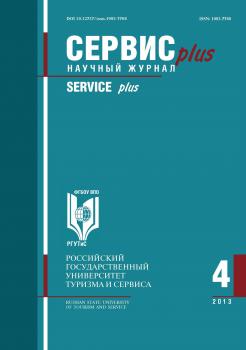Vladimir, Vladimir, Russian Federation
The development of tourism is significantly influenced by two main criteria: the availability of means and free time. It is the financial factor that is an obstacle to the development of mass tourism and consumer demand for goods and services. This article is devoted to determining the categories of the population and the distribution of the population of the Russian Federation by their ability to realize their opportunities for travel, and also to find ways of solving this problem. In the ratings of world agencies, the level of life quality of Russians is estimated by various values; the 67th position in the worldwide rating can be considered the most optimal. Using the method of statistical modeling, the author identified trends of the prevailing overall outflows of Russians and the prevailing outflows of Russians for tourism and recreation from 2014 in comparison with the entry of foreign visitors. The hypothesis of the wealth of Russians was not so optimistic either with the author’s life experience or with the average per capita monetary incomes of the population of Russia. Analysis of the population in the Vladimir and neighboring areas – Ivanovo and Ryazan – shows that their population has been steadily and steadily declining over the past 25 years. This provision determined the need to study the differentiation of income of the population with the subsequent imposition of the trend of per capita monetary income of the population on the departure of Russians abroad. At the same time, correlation dependence was revealed in the growth trends of the money incomes of the population and the departure of Russian citizens abroad. The division of the population into zones of financial possibilities makes it possible to identify the categories of the population and their opportunities for carrying out various types of tourist activities, as well as opportunities in shaping demand in the market for goods and services. The principle of financial zoning of the population according to their capabilities can be used for planning tourist flows, the consumer market for the supply of goods and services for various purposes.
tourism, wage, monetary income, population, financial capacity, social inequality
1. Khwaja A. N., Problems and promising directions of culture and museum tourism in the countries of the «Arab spring». Nauchno-prakticheskii zhurnal VAK «Sovremennye problemy servisa i turizma», vol. 10, no. 2, 2016, pp. 72-78. ISSN 1995-0411, e-ISSN 2414-9063, DOI: 10.12737 / 19507. (In Russ.) Available at: http://spstjournal.org/Archive_article/2016/2016_02/08_Khwaja.pdf.
2. Khwaja A. N., Role and features of the rural tourism cluster in ensuring sustainable regional development. The Third International Conference on Economic Sciences: Proceedings of the Conference (September 6, 2014). Vienna, OR: "East West" Association for Advanced Studies and Higher Education GmbH, pp. 95-100. ISBN-13 978-3-902986-41-2; ISBN-10 3-902986-41-7. Available at: https://ew-a.org/upload/iblock/d89/Conf-Economy-03.pdf.
3. Roberts M.V., Baikov A.V., The Role of the Branding Strategies in the Promotion of Vladimir Region (Russia). The 3rd International Conference on Management and Technology in Knowledge, Service, Tourism & Hospitality 2015 (SERVE 2015) 01-02 August 2015. Bandung, Indonesia: CRC Press, Taylor & Francis Group, 2015, pp. 23-29.
4. Roberts M.V., The role of regional policy in the sphere of tourism in the formation of a positive image of the territory. Innovative technologies in the service: proceedings of IV International scientific and practical conference on December 18-19, 2014. St. Petersburg: Publishing House of St. Petersburg State University, 2015, pp.83-85. (In Russ.)
5. Khwaja A. N., French experience in tourism development management. Servis v Rossii i za rubezhom, vol. 10, no. 4 (65), 2016, pp. 132-140. DOI: 10.12737 / 20190. ISSN 1995-0429X. (In Russ.) Available at: http://servicerusjournal.ru/content/number65/12.htm.
6. Khwaja A. N., Criteria and indicators for evaluating the effectiveness of the cluster. 2nd International Conference "Economy modernization: new challenges and innovative practice". Conference Proceedings. San Francisco, California, USA / Sheffield, UK: Scope Academic House/ B & M Publishing, 2nd November 25, 2014, pp. 118-120. ISBN-10: 1941655149; ISBN-13: 978-1-941655-14-6. DOI: 10.15350 / UK_3 / 2. Available at: http://www.colloquiumpublishing.ru/doc_konf_eng/UK_3_2.pdf.
7. Rassadin B.I., Likhtenval'd A.V., Consumer basket should become a source of forming the healthy nation. Uroven' zhizni naseleniya regionov Rossii, no. 7, 2013, pp. 122-128. (In Russ.)
8. Zhmachinsky V.I., Cherneva R.I., Living standard evaluation technique. Ekonomicheskii analiz: teoriya i praktika, no. 9 (456), 2016, pp. 55-66. (In Russ.)
9. Nyukhnya I.V., Poverty as threat of economic security of the state: methodical aspects and system realities. Sotsial'no-ekonomicheskie yavleniya i protsessy, vol. 10, no. 10, 2015, pp. 98-104. (In Russ.)
10. Puzikov V.G., Timofeev A.F., Socio-economic consequences of poverty in post-soviet Russia. Vestnik Sibirskogo instituta biznesa i informatsionnykh tekhnologii, no. 3 (19), 2016, pp. 73-78. (In Russ.)
11. Cherdantseva I.V., Problem of poverty level of the population in tomsk region: post-crisis restoration. Vestnik Tomskogo gosudarstvennogo pedagogicheskogo universiteta, no. 5 (146), 2014. (In Russ.)
12. Kosharnaya G.B., Karimova L.F., Factors determining the risk of poverty of the population in modern Russian society (regional aspect). Izvestiya Saratovskogo universiteta. Novaya seriya. Seriya Sotsiologiya. Politologiya, vol. 14, no. 4, 2014, pp. 36-40. (In Russ.)
13. Morgunova R.V., Morgunova N.V., Management of relations with stakeholders as the basis of transformation to social management. Natsional'nye interesy: prioritety i bezopasnost', no. 14, 2011, pp. 48-52. (In Russ.)
14. Klimonova A.N., Need of leveling of the social and economic inequality as one of the strategic directions in area providing economic security of the state. Sotsial'no-ekonomicheskie yavleniya i protsessy, vol. 10, no. 9, 2015, pp. 74-
15. Erhard L., Welfare for all. Moscow: Start-Press, 1991. (In Russ.)
16. Delyagin M., A new crisis in Russia is inevitable. (In Russ.) Available at: http://old.delyagin.ru/articles/2846-mikhail-delyagin-novyj-krizis-v-rossii-neizbezhen.html.
17. Delyagin M., The crisis creates in Russia \ "new poor \". (In Russ.) Available at: http://maxpark.com/user/4296722864/content/4006777.
18. (In Russ.)

















